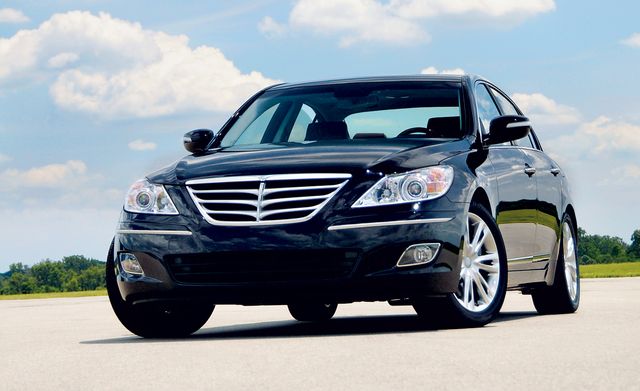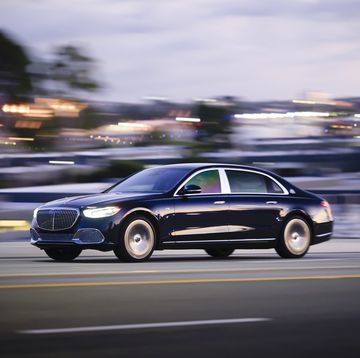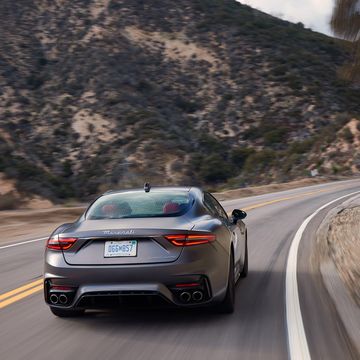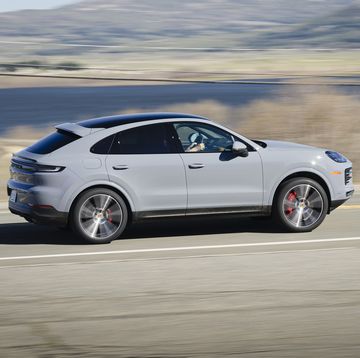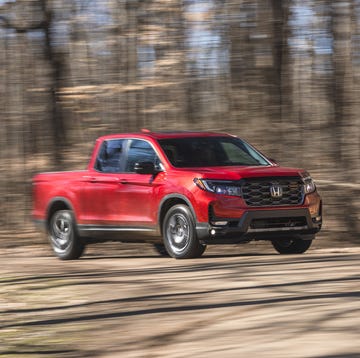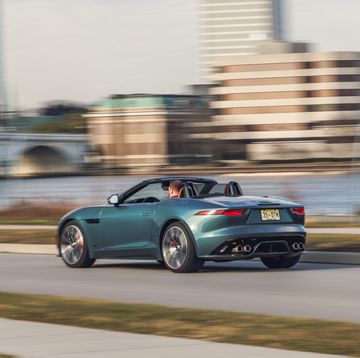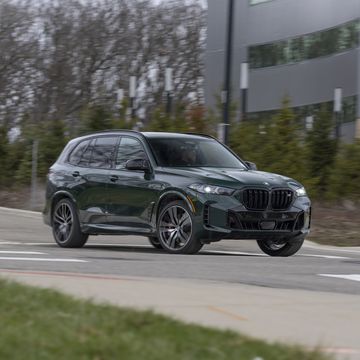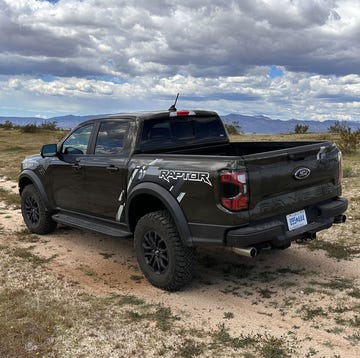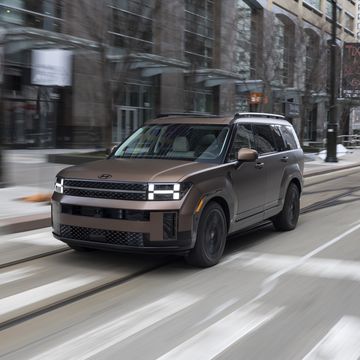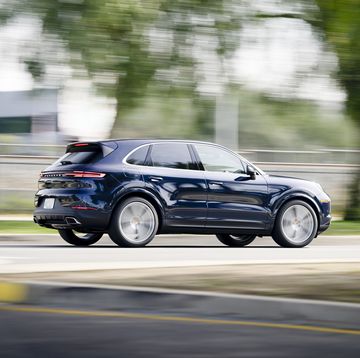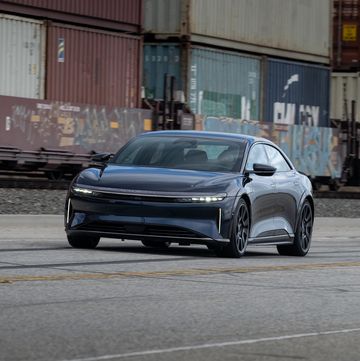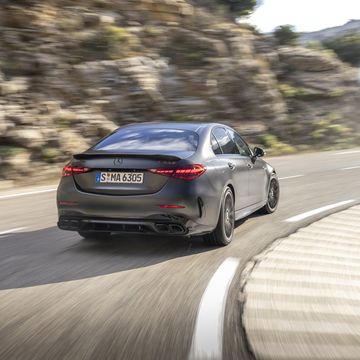Before we buckle up, we must first invoke a temporary vocabulary-restraining order: At no time will the term luxury sports sedan be used to describe this car. At least not by us. Luxury, yes, and sedan, obviously. But sports, nope, sorry, we’re putting that appellation on hold.
If you’ve already checked the specifications, you may wonder why we post the proviso. The 2009 Hyundai Genesis looks pretty formidable on paper, particularly with the optional 4.6-liter V-8 engine, and a lot of people in the Hyundai organization think their new car measures up pretty well against sporting stalwarts from BMW, Mercedes, and Audi. A clue to their conviction can be seen in the Genesis promotional literature, which is sprinkled with “sports sedan” references.
There’s no question that, in general, Hyundai’s development team checked the right boxes for their ambitious leap to this high-stakes, high-profit game. However, this isn’t really a huge surprise because, after all, they had a script, written by Toyota for the development of the 1989 Lexus LS400. So the formula is one that’s now familiar: respectable performance, decent quality, and lots of features wrapped in attractive sheetmetal at an even more attractive price.
That last—pricing—has been the key to Hyundai’s remarkable progress since it made its first appearance in the U.S. market in 1985 with the Excel, which was loosely related to the Mitsubishi Mirage and also sold as the Mitsubishi Precis. With a 0-to-60-mph time of 16.3 seconds, our test crew called the Excel “faster than speeding molasses,” [ C/D, March 1986]. But thanks to lower Korean labor costs, Hyundai was able to price the Excel considerably below competing small cars.
The Genesis, obviously, shares only a brand name with that primitive ’80s Excel, but the marketing theory is similar. Pricing for this new luxo four-door starts at $33,000, including the $750 destination charge. That’s for the 290-hp, 3.8-liter V-6 version. The 375-hp, 4.6-liter V-8 adds $5000 to the base price—$58.82 per pony. Not all that much, really, when you consider the cars with V-8 power that Hyundai seeks to usurp. The base price for a BMW 550i is $59,625, and the least expensive 5-series, the 528i, starts at $45,425.
Others: Audi A6 4.2, from $57,075; Infiniti M45, from $51,065; Lexus GS460, from $53,785; Mercedes E550, from $60,575. (We should add that with the exception of the Genesis, these are 2008 prices.)
Here’s what you get for your 38-grand base price. In addition to the V-8 and ZF six-speed automatic (the 3.8-liter V-6 is mated to an Aisin B600 six-speed auto), the luxury inventory includes a power tilt/slide sunroof; two-tone leather upholstery and upper dash, stylishly stitched; tasteful wood trim; heated power front seats; a 15-speaker sound system; electroluminescent instruments; Bluetooth hands-free phone connectivity; dual-zone automatic climate control; memory presets for seat position and steering column (power adjustable for rake and reach); a power rear sunshade; and cruise control (Hyundai will add an adaptive feature later).
Our test car had the only option group offered, the $4000 Technology package: 17-speaker audio with an in-dash six-DVD changer, XM satellite radio, an iDrive-style control that’s actually user-friendly, a nav system, HID headlamps, a backup warning camera, driver’s seat cooling, and front and rear park-assist sensors.
You get the idea—lots of the goodies you’d expect of a luxury car, in a handsomely executed interior. Make that handsome and exceptionally roomy. This is a big car by the standards of the class to which it aspires—bigger than any of its target competitors, with interior volume that’s more consistent with cars one size up the scale. Lots of trunk, too—16 cubic feet.
Hyundai has taken pains to make sure the Genesis is as quiet as it is roomy—another page from the Lexus playbook. At a 70-mph cruise, the needle on our sound meter once quivered just below 69 dBA, but we wound up with an average of 70—good but not exceptional. Noise suppression is fine, of course, but how silent should it be? We think a little basso profundo in the exhaust note would enhance the driving experience. To which we’ll return shortly.
Exterior design is obviously critical to a company attempting to invade the prestige ranks, and here again it looks as though Hyundai has followed the Lexus script. Created to invade German turf, the original LS400 was a shameless Mercedes derivative that worked. The Genesis can be perceived as derivative, too, but pinpointing the origin of the derivations provokes debate. Mercedes? BMW? Lexus? The S-class–style grille is eye-catching, and the short front overhang suggests athleticism, but the overall look is a little generic.
We mentioned the suggestion of athleticism, and that’s what it is: a visual suggestion quickly tempered by dynamic realities when the road acquires curves and kinks. As we noted in our August preview test, Hyundai didn’t skimp on the suspension, which employs multilink hardware fore and aft, with aluminum componentry. But it didn’t take long on some of our favorite back roads to convince us that the decisions made by the chassis engineers in the area of spring rates and damping could benefit from a little revision. Maybe more than a little.
On smooth freeway stretches, the ride is creamy and quiet. But on those back roads, contoured and crinkled by Michigan winters, it was not difficult to use up all of the suspension travel, yielding hard bumps and episodes of head toss.
Grip from the all-season Dunlop SP Sport tires (235/50-18) was so-so at 0.83 g, and braking performance was decent at 170 feet from 70 mph. But the Genesis absolutely refuses to be hurried through corners, exhibiting understeer that starts at resolute and progresses if the pilot persists with the throttle. This reluctance also colors the car’s transient response, aggravated by variable-assist, power rack-and-pinion steering that confuses effort with feel.
The back-road contrast between the Genesis and a BMW 528i we borrowed to put the new Hyundai in perspective was revelatory. BMW defines the luxury-sports-sedan realm, and assessed by the 528i’s standard of response and balance, it’s a fraternity to which the Genesis does not yet belong [see next page].
But competing as a luxury cruiser, the Genesis rates well. Besides quiet operation, a handsome and roomy interior, and a pleasant freeway ride, there’s the seductive thrust of its V-8 engine, code-named Tau.
Sophisticated suspension and all-new rear-drive platform notwithstanding, the DOHC 32-valve all-aluminum Tau V-8 is the most significant engineering achievement connected with the Genesis. It breaks no new ground—continuously variable valve timing and dual-length intake runners are not uncommon today—but Hyundai manages to extract more horsepower per liter than competing V-8s and insists it’s okay to use unleaded regular: 375 horsepower burning premium, 368 on regular.
Fuel economy is also a strong suit, with the EPA projecting 17 mpg city, 25 on the highway. Our test average was 19 mpg.
We also give high marks to the ZF six-speed automatic for smooth operation, although there are a couple of demerits. It lacks the paddle shifters that are de rigueur for sports sedans today, and it will upshift on its own in sport mode. A bigger problem with the transmission in our test car was premature upshifting, well below the car’s 6750-rpm redline, regardless of driver input. This held the Genesis back in acceleration runs, where it took six seconds to reach 60 mph and clocked the quarter-mile in 14.5 seconds at 101 mph. Our August preview test, conducted at Hyundai’s proving grounds in Korea, yielded 0 to 60 in 5.6 seconds and the quarter in 14.1 at 103 mph.
Hyundai techs tried reflashing the transmission’s computer but to no avail, so we put this down as a preproduction anomaly and expect showroom-ready cars to perform very much like our preview-test car.
Though we have reservations about this new car’s membership in the premium-sports-sedan club, Hyundai has otherwise done everything right, including impressive fit and finish. Given the company’s short history—the Korean industrial conglomerate didn’t even have an automotive division until 1967—it’s an amazing achievement.
Hyundai has obviously come a very long way in a remarkably short time. The question is whether the Genesis, like the VW Phaeton, will be a case of coming too far too soon. The company chose to avoid the massive investment required for a second marketing channel, Ã la Lexus, and regardless of its achievements in terms of engineering and quality, we think it’s safe to say—call us crazy—that Hyundai doesn’t have quite the same brand cachet as BMW. Value, the cornerstone of Hyundai’s phenomenal growth, is important to all buyers, but how big a factor will it be in a prestige market? Big enough? You can bet that many Hyundai execs are asking these same questions.
SPORTWISE:
Versus the BMW 528i
With rear-drive, a thoroughly modern four-wheel independent suspension, a sophisticated six-speed automatic, and a gutsy 375-hp V-8, the Genesis has the makings of a European sports sedan. To see whether it has the mojo, we put it up against the BMW 528i, the German sedan closest to it in price.
The Genesis effortlessly outpowers the 528i, but its performance superiority ends there. The Hyundai’s stopping distances are longer, and cornering grip is way down.
More importantly, the BMW moves with a taut and responsive sureness that the Genesis can’t match. The Hyundai’s steering feels synthetic, with abrupt changes in effort that are only vaguely related to what the car is doing, and it transmits more kickback than is justified by the muted communication.
The Genesis’s suspension is firm over small bumps, but this doesn’t translate into good body control when the going gets quick. Still, large bumps don’t throw it off course. The engine delivers all of the thrust you can use, but kickdown shifts could be quicker.
Though falling short of the BMW’s sporting standard, the Genesis is better on fast back roads than the cushy Lexus LS460 and way better than the loosey-goosey Toyota Avalon.
PRICE AS TESTED: $54,025 (base: $45,425)
POWERTRAIN: DOHC 24-valve 3.0-liter inline-6, 230 hp, 200 lb-ft; 6-speed automatic with manumatic shifting
DIMENSIONS:
Wheelbase: 113.7 in Length: 191.1 in Width: 72.7 in Height: 57.8 in
Curb weight: 3736 lb
C/D TEST RESULTS:
Zero to 60 mph: 6.9 sec
Standing ¼-mile: 15.3 sec @ 93 mph
Top speed (governor limited): 147 mph
Braking, 70–0 mph: 160 ft
Roadholding, 300-ft-dia skidpad: 0.90 g
FUEL ECONOMY:
EPA city/highway driving: 18/27 mpg
C/D observed: 13 mpg
________________________________________________________________________________________
LUXURYWISE:
Versus the Lexus LS460
When the Lexus LS400 appeared in 1989, it challenged the luxury order with more opulence, refinement, and reliability—though less driving exhilaration—at a much lower price. Does this Hyundai do the same to the now-established Lexus?
It’s a tough challenge because this fourth-gen LS is as smooth and silky as any car on the planet. It glides down the road in hushed serenity, with only a faraway hum from its powertrain and almost complete immunity to pavement imperfections that vex other cars.
The Genesis’s powertrain is almost as refined as the one in the LS460, but you can sense a little graininess that’s not present in the Lexus. The same goes for the Hyundai’s suspension, which doesn’t filter bumps as effectively as that of the big Lexus.
Inside, the Lexus is superbly finished and well laid out. The Genesis can’t match the quality of the more expensive car’s materials, but it does have a rich look, there’s a logical layout of the controls, and the 528i and Avalon just don’t compare in this area.
Given that it costs 40 percent less than the Lexus, the Genesis is definitely in the hunt—as long as the buyer doesn’t care about the badge on the trunk.
PRICE AS TESTED: $75,774 (base: $63,665)
POWERTRAIN: DOHC 32-valve 4.6-liter V-8, 380 hp, 367 lb-ft; 8-speed automatic with manumatic shifting
DIMENSIONS:
Wheelbase: 116.9 in Length: 198.0 in Width: 73.8 in Height: 53.1 in
Curb weight: 4530 lb
C/D TEST RESULTS:
Zero to 60 mph: 6.0 sec
Standing ¼-mile: 14.5 sec @ 100 mph
Top speed (governor limited): 130 mph
Braking, 70–0 mph: 182 ft
Roadholding, 300-ft-dia skidpad*: 0.80 g
FUEL ECONOMY:
EPA city/highway driving: 16/24 mpg
C/D observed: 17 mpg
*Stability-control-inhibited.
________________________________________________________________________________________
ECONOMYWISE:
Versus the Avalon XLS
In our latest comparison of large family sedans [“$30,000 Family Sedans,” July 2005], we found that the best combination of space, comfort, utility, and value was delivered by the Avalon. Now, the Genesis provides a V-8 for only a few grand more than the cost of a loaded Avalon, and the V-6 Genesis almost matches the Avalon’s price.
Judged by sheer carrying capacity, the two cars are a wash—with the Avalon having a larger back seat and the Genesis leading in front-seat and trunk space. But both cars are very roomy, with bigger back seats than the LS460 and more space everywhere than the relatively cramped 528i.
Not surprisingly, given its low price, the Avalon’s interior is the least fancy of this group. The design and materials are clean and tasteful, but it hardly conveys a rich impression. The Genesis’s finish looks to be a class above in both regards. Nor can the Avalon match the refined road manners of the other admittedly more expensive cars.
With its front-drive layout, spacious cabin, decent fuel economy, and low price, the Avalon is a great practical sedan. But for a little more money, the Genesis adds a useful increment of power, luxury, and performance.
PRICE AS TESTED: $35,263 (base: $32,285)
POWERTRAIN: DOHC 24-valve 3.5-liter V-6, 268 hp, 248 lb-ft; 6-speed automatic with manumatic shifting
DIMENSIONS:
Wheelbase: 111.0 in Length: 197.2 in Width: 72.8 in Height: 58.5 in
Curb weight: 3608 lb
C/D TEST RESULTS:
Zero to 60 mph: 6.3 sec
Standing ¼-mile: 14.8 sec @ 98 mph
Top speed (governor limited): 135 mph
Braking, 70–0 mph: 183 ft
Roadholding, 300-ft-dia skidpad*: 0.78 g
FUEL ECONOMY:
EPA city/highway driving: 19/28 mpg
C/D observed: 24 mpg
*Stability-control-inhibited.
- Csaba Csere
Csaba Csere joined Car and Driver in 1980 and never really left. After serving as Technical Editor and Director, he was Editor-in-Chief from 1993 until his retirement from active duty in 2008. He continues to dabble in automotive journalism and WRL racing, as well as ministering to his 1965 Jaguar E-type, 2017 Porsche 911, 2009 Mercedes SL550, 2013 Porsche Cayenne S, and four motorcycles—when not skiing or hiking near his home in Colorado.
